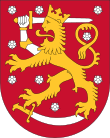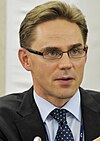2011 Finnish parliamentary election: Difference between revisions
→Campaign: AGF but section is undergoing expansion and also already includes other oartie |
|||
| Line 159: | Line 159: | ||
==Campaign== |
==Campaign== |
||
{{expand section|date=March 2011}} |
{{expand section|date=March 2011}} |
||
===Posturing about the True Finns party=== |
|||
True Finns said that Finland should not financially support the [[European Financial Stability Facility]] that led to bailouts for Ireland and Greece. Timo Soini asked "How come they (the European Union) can’t see the euro doesn’t work?"<ref>http://www.bloomberg.com/news/2011-02-28/true-finns-threaten-debt-bailout-plan-as-april-election-nears-euro-credit.html</ref> The party [[manifesto]] said that they would support a [[capital gains]] tax increase from 28% to 30%<ref>http://www2.helsinkitimes.fi/htimes/domestic-news/politics/14413-true-finns-propose-progressive-capital-gains-tax-scheme-.html</ref> and an increased tax on [[alcohol]]. They also opposes mention of Finland’s EU membership in the constitution and wanted to cut social [[welfare]] for immigrants.<ref>http://yle.fi/uutiset/news/2011/02/true_finns_publish_election_manifesto_2391059.html?origin=rss</ref> He also suggested Finland should unilaterally withdraw from the [[emission trade system]] and some other international commitments and that giving up the euro was an option. While speculating about a possible ministerial portfolio he later backed down on commitments when journalists asked him if the issues would be True Finns' demands in any possible government formation talks citing the proposals as his opinion and not necessarily in place for a government’s policy programme. He continued maintain that the EU membership issue in the constituion would be threshold issue in government talks. ''[[Helsingen Sanomat]]'' suggested that these demands could prove detrimental to a chance for True Finns to join a governing coalition.<ref name="constitution">http://www.hs.fi/english/article/COMMENTARY+Will+Timo+Soini+stumble+on+his+own+threshold/1135263478484</ref> |
True Finns said that Finland should not financially support the [[European Financial Stability Facility]] that led to bailouts for Ireland and Greece. Timo Soini asked "How come they (the European Union) can’t see the euro doesn’t work?"<ref>http://www.bloomberg.com/news/2011-02-28/true-finns-threaten-debt-bailout-plan-as-april-election-nears-euro-credit.html</ref> The party [[manifesto]] said that they would support a [[capital gains]] tax increase from 28% to 30%<ref>http://www2.helsinkitimes.fi/htimes/domestic-news/politics/14413-true-finns-propose-progressive-capital-gains-tax-scheme-.html</ref> and an increased tax on [[alcohol]]. They also opposes mention of Finland’s EU membership in the constitution and wanted to cut social [[welfare]] for immigrants.<ref>http://yle.fi/uutiset/news/2011/02/true_finns_publish_election_manifesto_2391059.html?origin=rss</ref> He also suggested Finland should unilaterally withdraw from the [[emission trade system]] and some other international commitments and that giving up the euro was an option. While speculating about a possible ministerial portfolio he later backed down on commitments when journalists asked him if the issues would be True Finns' demands in any possible government formation talks citing the proposals as his opinion and not necessarily in place for a government’s policy programme. He continued maintain that the EU membership issue in the constituion would be threshold issue in government talks. ''[[Helsingen Sanomat]]'' suggested that these demands could prove detrimental to a chance for True Finns to join a governing coalition.<ref name="constitution">http://www.hs.fi/english/article/COMMENTARY+Will+Timo+Soini+stumble+on+his+own+threshold/1135263478484</ref> |
||
Revision as of 16:38, 6 March 2011
| |||||||||||||||||||||||||||||||||||||||||||||||||||||||||||||||||||||
All 200 seats to the Parliament | |||||||||||||||||||||||||||||||||||||||||||||||||||||||||||||||||||||
|---|---|---|---|---|---|---|---|---|---|---|---|---|---|---|---|---|---|---|---|---|---|---|---|---|---|---|---|---|---|---|---|---|---|---|---|---|---|---|---|---|---|---|---|---|---|---|---|---|---|---|---|---|---|---|---|---|---|---|---|---|---|---|---|---|---|---|---|---|---|
| |||||||||||||||||||||||||||||||||||||||||||||||||||||||||||||||||||||
| |||||||||||||||||||||||||||||||||||||||||||||||||||||||||||||||||||||
 |
|---|
The election to the Eduskunta will be held on 17 April 2011, with advance voting between 6 and 12 April,[1] including for Finnish expatriates.[2] All 200 seats of the parliament are open for election.
Background
The current government is considering proposals for a new constitution, including a controversial phrase in the first paragraph of the third clause that that "Finland is a member of the European Union." It was speculated that the current government could finalist the constitution before elections but it would have to be ratified by the new parliament.[3]
Electoral method
Following the problem-ridden[4] limited electronic voting experiment of the 2008 municipal elections, the Ministry of Justice announced in January 2010 that there would be no electronic voting at this time, but that the ministry would be monitoring the international arenas for development of online voting.[5]
Campaign funding
This would also be the first election since the Act on a Candidate’s Election Funding came into force in May 2009, along with the 2010 amendments to the Act on Political Parties. Both acts of law deal with issues pertaining to the disclosure of the sources of campaign finance and expenses. Every candidate must disclose its source of funding, as well as the parties as whole.[6]
Campaign funding starts six months before election day and ends two weeks after the election regardless of when the costs are actually paid. The candidates must file a public report with The National Audit Office detailing their sources of all contributions of over 1,500 euros in value raised in support of the election campaign. The funds include expenses from the candidate’s own funds, loans taken out for the campaign and contributions received by either the individual or a group that supports the candidate.[7][6]
Candidates are barred from receiving anonymous contributions of over 1,500 euros in value.[7]
Parties
In November 2010, there were 17 registered parties. Eight of the parties are represented in the current parliament: Centre Party, National Coalition Party, Social Democrats, Left Alliance, Green League, Swedish People's Party, Christian Democrats and True Finns. Nine of the registered parties do not have representation in the parliament before the elections: Communist Party of Finland, Senior Citizens' Party of Finland, Communist Workers' Party – For Peace and Socialism, Workers Party of Finland, Independence Party, For the Poor, Pirate Party, Change 2011, and Freedom Party.[8]
Party conferences
All major[vague] parties held party conferences in May or June 2010 where they elected the party leadership for the election and approved an election manifesto.
The Green League held its party conference between 22 and 23 May. The current Minister for Labour, Anni Sinnemäki, was re-elected as the party leader.[citation needed] The Social Democrats re-elected Jutta Urpilainen as chairman at the party conference held from 28 to 30 May in Joensuu. She beat Erkki Tuomioja, Tarja Filatov, Ilkka Kantola and Miapetra Kumpula-Natri after she got 218 votes, Tuomioja got 132 votes and the others received no votes.[9] Former CEO of the state-owned Finnish Broadcasting Company Mikael Jungner became party secretary. Helsingin Sanomat reported that he was expected to become a "high profile" party secretary with "a pivotal position when the SDP tries to secure a comeback victory in the elections."[10]
Then Prime Minister of Finland and chairman of the Centre Party Matti Vanhanen informed that he would be stepping down from both positions during June 2010. In a party conference held between June 11 and 13, then Minister for Regional and Municipal Affairs, Mari Kiviniemi, was elected as the new chairman. Mr. Vanhanen stepped down from the position of Prime Minister a few days later. He was replaced by Mrs. Kiviniemi, who became the second female Prime Minister of Finland in history.[11]
National Coalition Party reelected the current Minister for Finance, Jyrki Katainen, as the party leader on June 12.[12]
Retiring incumbents
Matti Vanhanen, the Prime Minister of Finland between June 2003 – June 2010, began to work as the Chief Executive of Finnish Family Firms Association and will not be participating in the elections.[13]
The current Speaker Sauli Niinistö (National Coalition Party) will not be running for Parliament, despite receiving a record number of votes in the 2007 election. It is anticipated that he will be the National Coalition Party's presidential candidate in 2012. [14]
Also the following ex-ministers sitting in the current Parliament have announced that they will not be running in these elections: Matti Ahde, Antti Kalliomäki and Jacob Söderman from the Social Democrats; Tanja Karpela and Hannes Manninen from the Centre and Raimo Vistbacka from the True Finns.[citation needed]
Campaign
This section needs expansion. You can help by adding to it. (March 2011) |
Posturing about the True Finns party
True Finns said that Finland should not financially support the European Financial Stability Facility that led to bailouts for Ireland and Greece. Timo Soini asked "How come they (the European Union) can’t see the euro doesn’t work?"[15] The party manifesto said that they would support a capital gains tax increase from 28% to 30%[16] and an increased tax on alcohol. They also opposes mention of Finland’s EU membership in the constitution and wanted to cut social welfare for immigrants.[17] He also suggested Finland should unilaterally withdraw from the emission trade system and some other international commitments and that giving up the euro was an option. While speculating about a possible ministerial portfolio he later backed down on commitments when journalists asked him if the issues would be True Finns' demands in any possible government formation talks citing the proposals as his opinion and not necessarily in place for a government’s policy programme. He continued maintain that the EU membership issue in the constituion would be threshold issue in government talks. Helsingen Sanomat suggested that these demands could prove detrimental to a chance for True Finns to join a governing coalition.[3]
Incumbent Prime Minister Mari Kiviniemi said that she was ready to work with any party in Finland. When pressed by the media she said that she would not rule out working with the True Finns pending cooperation on negotiating a government platform.[18]
Debates
The three biggest parties partook in a debate organised by the Finnish Business and Policy Forum in front of a crowd of businessmen. The Centre Party's Katainen said that as a result of February polling there were now four prime ministerial candidates from the four largest parties. However, True Finns' chairman and MEP Timo Soini was excluded because the various pollings presented at the time were different. All parties that the retirement age must not be lowered from 63. The SDP's Urpilainen said that the party would maintain a need to cut pensions and that increasing the retirement age is a form of cutting pensions; to support this she pointed out an earlier retirement age law at 65-years-old and that the age had been lowered. She also added that because of a large proportion of disabled pensioners younger people should join the workforce quickly after graduating. Katainen and the National Coalition's Kiviniemi said they would consider raising the retirement age to lengthen working years. Kiviniemi said that "Some of the directors of our large corporations are retiring at the age of 59-60. At the same time demands are being presented that people should work for longer." Urpilainen also said that lowering the value added tax on food was mistake, though she said that it should not be raised either.[19]
Polling
Taloustutkimus performs monthly telephone polls on party popularity for the Finnish Broadcasting Company. The monthly sample size varies between 2,900-3,900 with a margin of error of about ±1.8 %.[20]
Polling does not always include the Aland Islands.[21]
| Party | 2007 | Jan 2010 | Feb 2010 | Mar 2010 | Apr 2010 | May 2010 | Jun 2010 | Jul 2010 | Aug 2010 | Sep 2010 | Oct 2010 | Nov 2010 | Dec 2010 | Jan 2011 | Feb 2011 |
|---|---|---|---|---|---|---|---|---|---|---|---|---|---|---|---|
| Centre Party | 23.1% | 20.7% | 19.6% | 20.7% | 20.6% | 18.6% | 19.2% | 19.7% | 19.7% | 19.0% | 17.6% | 18.6% | 18.8% | 18.5% | 18.9% |
| National Coalition Party | 22.3% | 23.2% | 23.6% | 22.9% | 22.7% | 23.0% | 21.9% | 23.0% | 22.8% | 21.9% | 21.7% | 21.1% | 21.2% | 20.4% | 20.9% |
| Social Democrats | 21.4% | 21.0% | 21.2% | 21.2% | 21.3% | 21.3% | 21.1% | 20.5% | 20.4% | 19.8% | 19.1% | 18.4% | 18.1% | 18.9% | 17.5% |
| Left Alliance | 8.8% | 8.1% | 8.3% | 8.0% | 7.6% | 7.7% | 8.1% | 7.8% | 7.5% | 7.2% | 7.8% | 7.9% | 8.1% | 7.2% | 7.3% |
| Green League | 8.5% | 10.1% | 10.4% | 10.4% | 10.3% | 10.3% | 10.6% | 9.5% | 9.2% | 9.9% | 9.7% | 9.1% | 9.5% | 9.2% | 8.5% |
| Christian Democrats | 4.9% | 4.6% | 4.3% | 4.3% | 4.8% | 4.2% | 4.2% | 4.3% | 3.9% | 4.4% | 4.6% | 4.5% | 3.8% | 3.8% | 4.2% |
| Swedish People's Party | 4.6% | 4.1% | 4.1% | 4.0% | 3.6% | 3.7% | 3.9% | 4.0% | 4.4% | 3.9% | 4.2% | 4.0% | 3.4% | 4.1% | 3.9% |
| True Finns | 4.1% | 6.4% | 6.3% | 6.8% | 7.8% | 9.6% | 9.8% | 10.1% | 10.7% | 12.5% | 14.3% | 14.9% | 15.3% | 16.6% | 16.9% |
| Taloustutkimus/YLE | |||||||||||||||
Surveys indicated that the True Finns were eating into the Centre Party's vote bank in Lapland and the Left Alliance could also lose two of its seat in the constituency.[22] Suomen Kuvalehti said that on the whole the True Finns were attracting supporters from all the three largest parties and that one-fifth of its voters did not vote in the last election.[23]
A study conducted by Swedish and Finnish economists found that there is "a greater effect of good looks, in terms of more votes for candidates on the right."[24] A poll of Finnish teachers, mostly from southern and western Finland, indicated that 41% questioned by Oppettaja-lehti wanted limits of 20-30% on immigrant students in schools and daycare centres. A 75% majority also said that immigrants should be dispersed throughout the country to avoid concentrations of immigrant populations within certain areas. A majority also said that they had received no training to teach immigrants.[25]
References
- ^ a b "Election dates". Ministry of Justice. Retrieved June 12, 2010.
- ^ http://www.scandasia.com/viewNews.php?coun_code=ph&news_id=8309
- ^ a b http://www.hs.fi/english/article/COMMENTARY+Will+Timo+Soini+stumble+on+his+own+threshold/1135263478484
- ^ "New municipal elections in Vihti, Karkkila, and Kauniainen". Ministry of Justice. 23 April 2009. Retrieved 1 March 2011.
- ^ "Electronic voting will not be developed further on the current basis - Voting on the Internet is a probable development trend". Ministry of Justice. 14 January 2010. Retrieved 1 March 2011.
- ^ a b "Election Funding". Vaalit.fi service. Ministry of Justice. Retrieved 1 March 2011.
- ^ a b "Instructions for failing an election funding disclosure" (PDF) (in Finnish). National Audit Office of Finland. 10 December 2010. Retrieved 1 March 2011.
- ^ "List of Registered Parties". Ministry of Justice. 22 November 2010. Retrieved 27 December 2010.
- ^ http://www.sdp.fi/sites/www.sdp.fi/files/politiikka/PTK_2008.pdf
- ^ Helsingin Sanomat (May 28, 2010). "Jutta Urpilainen unanimously chosen for second term as SDP leader; ex-YLE managing director Mikael Jungner becomes party secretary". Helsingin Sanomat. Retrieved June 12, 2010.
- ^ Finnish Broadcasting Company (June 12, 2010). "Mari Kiviniemi Wins Centre Chair, Taking Over as PM". Finnish Broadcasting Company. Retrieved June 12, 2010.
- ^ Finnish Broadcasting Company (June 12, 2010). "Katainen Continues as NCP Chair". Finnish Broadcasting Company. Retrieved June 12, 2010.
- ^ "Ex-PM Vanhanen to head Finnish Family Firms Association". Helsinki Times. 24 June 2010. Retrieved 27 December 2010.
- ^ Finnish Broadcasting Company (May 1, 2010). "Niinistö Not Running for Parliament". Finnish Broadcasting Company. Retrieved August 19, 2010.
- ^ http://www.bloomberg.com/news/2011-02-28/true-finns-threaten-debt-bailout-plan-as-april-election-nears-euro-credit.html
- ^ http://www2.helsinkitimes.fi/htimes/domestic-news/politics/14413-true-finns-propose-progressive-capital-gains-tax-scheme-.html
- ^ http://yle.fi/uutiset/news/2011/02/true_finns_publish_election_manifesto_2391059.html?origin=rss
- ^ http://www.reuters.com/article/2011/03/03/finland-election-idUSOSN00506620110303
- ^ http://www.hs.fi/english/article/Katainen+Finland+now+has+four+prime+minister+candidates/1135263735615
- ^ "Puolueiden kannatusarviot" (in Finnish). Sections for 2010, 2009 and 2008: Taloustutkimus. Retrieved 27 December 2010.
{{cite web}}: CS1 maint: location (link) - ^ http://www.hs.fi/english/article/Poll+gives+new+record+for+support+for+True+Finns/1135263311508
- ^ http://www.hs.fi/english/article/Survey+indicates+True+Finns+are+taking+votes+from+Centre+Party+in+Lapland/1135263130357
- ^ http://www.hs.fi/english/article/Magazine+claims+True+Finns+are+attracting+supporters+from+all+three+large+parties/1135261265000
- ^ http://www.google.com/hostednews/afp/article/ALeqM5iWI-Ekd20c4ZtJnh6hJhZmUDisAA?docId=CNG.97fd7d31409a22b937a0af220188ab56.311
- ^ http://www.yle.fi/uutiset/news/2011/02/poll_41_percent_of_finnish_teachers_want_immigrant_quotas_2384000.html









